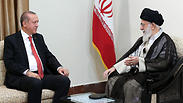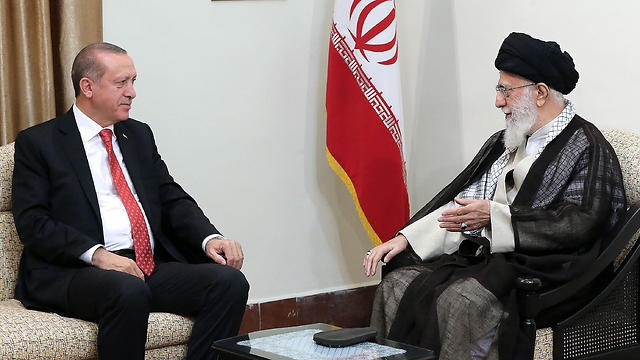
Iran claims US plans to use Kurdish independence vote to create second Israel in Middle East
During meeting with Turkish Pres. Erdoğan in Tehran, Iran’s Supreme Leader Khamenei accuses US of supporting Kurdish independence, as a means of creating another US ally in Middle East, like Israel; Erdoğan has accused Israel of supporting Kurdish referendum, which PM Netanyahu denied; US, for its part, has stated it opposes Kurds' independence referendum.
Iran’s Supreme Leader Ayatollah Ali Khamenei accused Iran’s arch nemesis, the United States of planning to create a new Israel in the Middle East by supporting the Kurdish independence vote in Iraq on Wednesday, during his meeting with Turkish President Recep Tayyip Erdoğan in Tehran.
“America and Israel benefit from the vote (...) America and foreign powers are unreliable and seek to create a new Israel in the region,” he said.
Iraq’s autonomous Kurdistan region said on Tuesday it was calling presidential and parliamentary elections for Nov. 1. Baghdad responded by announcing further punitive measures.
Erdoğan, whose security forces have been embroiled in a decades-long battle with Kurdish separatists in southeast Turkey, repeated his accusation that Israel was behind the Iraqi Kurds’ referendum.
“There is no country other than Israel that recognizes it. A referendum that was conducted by sitting side by side with Mossad has no legitimacy,” he said, referring to the Israeli intelligence agency.
Prime Minister Benjamin Netanyahu has denied Turkey’s previous claims of involvement in the vote, but has welcomed the Kurds’ vote for independence.
"I understand why (the Iraqi Kurdish independence—ed) is uncomfortable to those who support Hamas and want to see the Mossad everywhere, but Israel had no part in the Kurdish referendum, apart from the deep, natural sympathy the people of Israel have had for many years for the Kurdish people and their aspirations," Netanyahu said at the beginning of the week, during a cabinet meeting.
During his meeting with Erdoğan, Iran's Rouhani also said that Tehran and Ankara planned to expand economic ties. “Turkey will import more gas from Iran (...) Meetings will be held to discuss the details,” he said.
Iraq's central government, its neighbors and Western powers fear the vote in favor of secession could spark another, wider conflict in the Middle East region to add to the war in Syria. They fear it could derail the fight against Islamic State.
The Kurds are the region’s fourth-largest ethnic group, spread across Iran, Turkey, Syria and Iraq, all of which oppose any moves towards a Kurdish state.
The United States officially opposed the referendum, depicting it as a destabilizing move at a time when all sides in the region are still fighting Islamic State.
Turkish-Iran ties warm over Kurdish referendum threat
Relations have generally been cool between Shi‘ite Iran and mainly Sunni Turkey, a NATO member. But both have been alarmed by the Iraqi Kurds’ vote for independence last month, fearing it will stoke separatism among their own Kurdish populations.
“Turkey and Iran must take necessary measures against the vote (...) and Baghdad should make serious decisions (...) serious and rapid decisions must be taken,” Khamenei was quoted as saying.
“The Iraqi Kurdish secession vote is an act of betrayal toward the entire region and a threat to its future.”
Iran and Turkey have already threatened to join Baghdad in imposing economic sanctions on Iraqi Kurdistan and have launched joint military exercises with Iraqi troops on their borders with the separatist region.
Erdoğan, who was on a one-day trip to Tehran, said earlier that Ankara was considering taking further measures against Iraqi Kurdistan.
“We have already said we don’t recognize the referendum in northern Iraq (...) We have taken some measures already with Iran and the Iraqi central government, but stronger steps will be taken,” he said.
Rouhani and Erdoğan vowed to work closely together to prevent the disintegration of Iraq and Syria and to oppose the Iraqi Kurds’ drive for independence.
“We want security and stability in the Middle East (...) The referendum in Iraq’s Kurdistan is a sectarian plot by foreign countries and is rejected by Tehran and Ankara,” Rouhani said, according to state TV.
“We will not accept a change of borders under any circumstances.”












